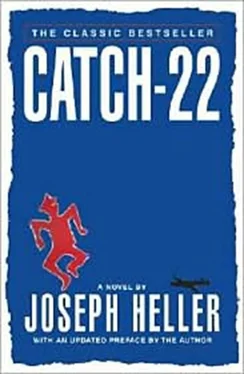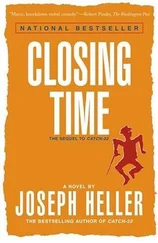Yossarian shook his head and explained that déjà vu was just a momentary infinitesimal lag in the operation of two coactive sensory nerve centers that commonly functioned simultaneously. The chaplain scarcely heard him. He was disappointed, but not inclined to believe Yossarian, for he had been given a sign, a secret, enigmatic vision that he still lacked the boldness to divulge. There was no mistaking the awesome implications of the chaplain’s revelation: it was either an insight of divine origin or a hallucination; he was either blessed or losing his mind. Both prospects filled him with equal fear and depression. It was neither déjà vu, presque vu nor jamais vu. It was possible that there were other vus of which he had never heard and that one of these other vus would explain succinctly the bafing phenomenon of which he had been both a witness and a part; it was even possible that none of what he thought had taken place, really had taken place, that he was dealing with an aberration of memory rather than of perception, that he never really had thought he had seen, that his impression now that he once had thought so was merely the illusion of an illusion, and that he was only now imagining that he had ever once imagined seeing a naked man sitting in a tree at the cemetery.
It was obvious to the chaplain now that he was not particularly well suited to his work, and he often speculated whether he might not be happier serving in some other branch of the service, as a private in the infantry or field artillery, perhaps, or even as a paratrooper. He had no real friends. Before meeting Yossarian, there was no one in the group with whom he felt at ease, and he was hardly at ease with Yossarian, whose frequent rash and insubordinate outbursts kept him almost constantly on edge and in an ambiguous state of enjoyable trepidation. The chaplain felt safe when he was at the officers’ club with Yossarian and Dunbar, and even with just Nately and McWatt. When he sat with them he had no need to sit with anyone else; his problem of where to sit was solved, and he was protected against the undesired company of all those fellow officers who invariably welcomed him with excessive cordiality when he approached and waited uncomfortably for him to go away. He made so many people uneasy. Everyone was always very friendly toward him, and no one was ever very nice; everyone spoke to him, and no one ever said anything. Yossarian and Dunbar were much more relaxed, and the chaplain was hardly uncomfortable with them at all. They even defended him the night Colonel Cathcart tried to throw him out of the officers’ club again, Yossarian rising truculently to intervene and Nately shouting out, “ Yossarian! ” to restrain him. Colonel Cathcart turned white as a sheet at the sound of Yossarian’s name, and, to everyone’s amazement, retreated in horrified disorder until he bumped into General Dreedle, who elbowed him away with annoyance and ordered him right back to order the chaplain to start coming into the officers’ club every night again.
The chaplain had almost as much trouble keeping track of his status at the officers’ club as he had remembering at which of the ten mess halls in the group he was scheduled to eat his next meal. He would just as soon have remained kicked out of the officers’ club, had it not been for the pleasure he was now finding there with his new companions. If the chaplain did not go to the officers’ club at night, there was no place else he could go. He would pass the time at Yossarian’s and Dunbar’s table with a shy, reticent smile, seldom speaking unless addressed, a glass of thick sweet wine almost untasted before him as he toyed unfamiliarly with the tiny corncob pipe that he affected selfconsciously and occasionally stuffed with tobacco and smoked. He enjoyed listening to Nately, whose maudlin, bittersweet lamentations mirrored much of his own romantic desolation and never failed to evoke in him resurgent tides of longing for his wife and children. The chaplain would encourage Nately with nods of comprehension or assent, amused by his candor and immaturity. Nately did not glory too immodestly that his girl was a prostitute, and the chaplain’s awareness stemmed mainly from Captain Black, who never slouched past their table without a broad wink at the chaplain and some tasteless, wounding gibe about her to Nately. The chaplain did not approve of Captain Black and found it difficult not to wish him evil.
No one, not even Nately, seemed really to appreciate that he, Chaplain Robert Oliver Shipman, was not just a chaplain but a human being, that he could have a charming, passionate, pretty wife whom he loved almost insanely and three small blue-eyed children with strange, forgotten faces who would grow up someday to regard him as a freak and who might never forgive him for all the social embarrassment his vocation would cause them. Why couldn’t anybody understand that he was not really a freak but a normal, lonely adult trying to lead a normal, lonely adult life? If they pricked him, didn’t he bleed? And if he was tickled, didn’t he laugh? It seemed never to have occurred to them that he, just as they, had eyes, hands, organs, dimensions, senses and affections, that he was wounded by the same kind of weapons they were, warmed and cooled by the same breezes and fed by the same kind of food, although, he was forced to concede, in a different mess hall for each successive meal. The only person who did seem to realize he had feelings was Corporal Whitcomb, who had just managed to bruise them all by going over his head to Colonel Cathcart with his proposal for sending form letters of condolence home to the families of men killed or wounded in combat.
The chaplain’s wife was the one thing in the world he could be certain of, and it would have been sufficient, if only he had been left to live his life out with just her and the children. The chaplain’s wife was a reserved, diminutive, agreeable woman in her early thirties, very dark and very attractive, with a narrow waist, calm intelligent eyes, and small, bright, pointy teeth in a childlike face that was vivacious and petite; he kept forgetting what his children looked like, and each time he returned to their snapshots it was like seeing their faces for the first time. The chaplain loved his wife and children with such tameless intensity that he often wanted to sink to the ground helplessly and weep like a castaway cripple. He was tormented inexorably by morbid fantasies involving them, by dire, hideous omens of illness and accident. His meditations were polluted with threats of dread diseases like Ewing’s tumor and leukemia; he saw his infant son die two or three times every week because he had never taught his wife how to stop arterial bleeding; watched, in tearful, paralyzed silence, his whole family electrocuted, one after the other, at a baseboard socket because he had never told her that a human body would conduct electricity; all four went up in flames almost every night when the water heater exploded and set the two-story wooden house afire; in ghastly, heartless, revolting detail he saw his poor dear wife’s trim and fragile body crushed to a viscous pulp against the brick wall of a market building by a half-wined drunken automobile driver and watched his hysterical five-year-old daughter being led away from the grisly scene by a kindly middle-aged gentleman with snow-white hair who raped and murdered her repeatedly as soon as he had driven her off to a deserted sandpit, while his two younger children starved to death slowly in the house after his wife’s mother, who had been baby-sitting, dropped dead from a heart attack when news of his wife’s accident was given to her over the telephone. The chaplain’s wife was a sweet, soothing, considerate woman, and he yearned to touch the warm flesh of her slender arm again and stroke her smooth black hair, to hear her intimate, comforting voice. She was a much stronger person than he was. He wrote brief, untroubled letters to her once a week, sometimes twice. He wanted to write urgent love letters to her all day long and crowd the endless pages with desperate, uninhibited confessions of his humble worship and need and with careful instructions for administering artificial respiration. He wanted to pour out to her in torrents of self-pity all his unbearable loneliness and despair and warn her never to leave the boric acid or the aspirin in reach of the children or to cross a street against the traffic light. He did not wish to worry her. The chaplain’s wife was intuitive, gentle, compassionate and responsive. Almost inevitably, his reveries of reunion with her ended in explicit acts of love-making.
Читать дальше












